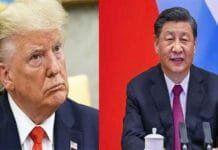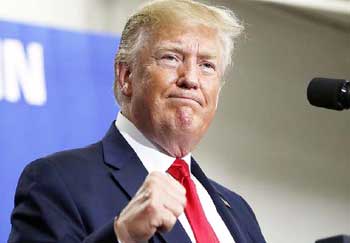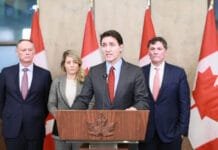Trump’s Threat Impact: U.S. Government Ships Can Now Pass Through Panama Canal Without Paying Fees
In recent developments, the Panama Canal has become the center of a growing geopolitical shift, following the direct influence of Donald Trump’s threats regarding control over the strategic waterway. These threats have now resulted in a significant policy change: Panama has agreed to eliminate the fees for U.S. government ships passing through the canal. This decision follows the visit of U.S. Secretary of State Marco Rubio to Panama and marks a new chapter in Panama-U.S. relations.
The Panama Canal, one of the most important waterways in global trade, has long been essential to the United States and its economic interests. This agreement, which comes with its own set of implications, marks a turning point in the relationship between the U.S. and Panama, particularly concerning the maritime traffic that flows through this essential route.
The Geopolitical Context: Trump’s Influence on the Panama Canal
Since his presidential campaign and subsequent victory, Donald Trump has consistently raised concerns about the Panama Canal’s management, especially in light of China’s growing influence in the region. Trump argued that the Canal, once handed over to Panama by the U.S., is now under the control of China, and has vowed to reclaim it, a statement he reiterated during his inauguration speech. These bold assertions have sent shockwaves through the international community, forcing Panama to reconsider its position in managing this critical asset.
While Trump’s rhetoric about seizing the canal may be exaggerated, the growing U.S. pressure on Panama cannot be ignored. The U.S. has long had a significant interest in the Panama Canal, a vital link for maritime traffic that connects the Atlantic and Pacific Oceans. With a considerable portion of global trade passing through the Canal, including U.S. exports, it is no surprise that the current administration sees it as an issue of national security and economic stability.
The Economic Implications for the U.S. Government
The U.S. government’s ability to pass through the Panama Canal without paying fees will have profound financial implications. As the U.S. Department of State indicated, this agreement will result in millions of dollars in savings for the federal government. The Panama Canal Authority (PCA) has long charged fees for ships, especially those belonging to foreign governments. With this new policy, U.S. government vessels, including those from the military, will be exempt from these charges. This move comes at a time when the U.S. is actively pursuing cost-saving measures across all sectors, particularly in defense and international trade.
Moreover, the Panama Canal serves as a crucial hub for the U.S. maritime trade, directly affecting the movement of goods from the eastern to the western coasts of the country. The cancellation of these fees will allow for more efficient operations and better budgeting for maritime logistics, ultimately benefiting the U.S. economy.
Marco Rubio’s Visit to Panama: A Turning Point in Relations
U.S. Secretary of State Marco Rubio’s recent visit to Panama highlighted the growing concerns about China’s influence in the region. Rubio, alongside Panamanian President José Raúl Mulino, discussed ways in which Panama can reduce China’s footprint in the operation and control of the Panama Canal. Rubio warned that if Panama did not act, the Trump administration would take necessary measures to ensure U.S. rights over the Canal were protected.
During his visit, Rubio also toured the Canal with Ricardo Vasquez, the current administrator of the Panama Canal Authority, where discussions were held about securing the region’s future and countering China’s role in the Canal’s operations. Rubio’s stance emphasized U.S. interests in the region and reaffirmed the administration’s willingness to take direct action if necessary to safeguard American maritime access and trade routes.
Why the Panama Canal is So Critical to Global Trade
The Panama Canal is widely considered one of the greatest engineering feats in the world. At 82 kilometers long, it is the world’s most important artificial waterway, connecting the Atlantic and Pacific Oceans. As a major transit route for both commercial and military shipping, the canal plays an indispensable role in global supply chains.
Approximately 6% of world trade flows through the Panama Canal annually. This includes the movement of goods such as oil, grain, and manufactured products. For the U.S., the Canal is even more critical, facilitating around 14% of its global trade. American cargo ships, traveling between New York and San Francisco, rely heavily on the Canal to shorten the distance by 8370 kilometers compared to taking the older route, which requires sailing around the entire continent of South America, adding an additional 13,000 kilometers to their journey.
Thus, the Panama Canal is not just important for Panama itself but for the entire global economy. A disruption in the operations of the Canal would have far-reaching consequences, potentially creating a bottleneck in global trade.
Panama Canal’s Historic Importance
The Panama Canal was initially conceived by France in 1881, but it wasn’t until 1914 that the U.S. completed its construction. Following the completion of the Canal, the U.S. maintained control over it until 1999, when the Panama Canal Treaty was signed, transferring control to the Panama Canal Authority under the government of Panama.
The Panama Canal’s strategic location between the Atlantic and Pacific Oceans made it an essential route for military and commercial purposes. Throughout the 20th century, it served as a symbol of American power and technological achievement. Today, it remains an engineering marvel and a crucial linchpin in the global trade network.
The Future of U.S.-Panama Relations and the Canal’s Role
The Trump administration’s stance on the Panama Canal underscores its commitment to protecting U.S. interests in the region. Whether or not the U.S. takes more drastic actions in the future, Panama’s decision to waive fees for U.S. government ships shows the importance of diplomatic relations and the leverage that the U.S. holds in global affairs.
For Panama, maintaining a strong relationship with the U.S. is essential for economic stability, given the Canal’s revenue generation and its importance to both countries. The future of the Canal will likely continue to be shaped by global geopolitical dynamics, as China remains an influential player in the region.





















